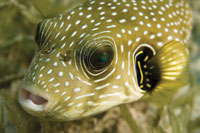If any of the following betta fish illnesses describe the symptoms that your fish is exhibiting, then you may want to read up on how to diagnose and treat these betta fish illnesses before it gets too late.
Fungal Infection - Your betta develops white patches on its head or on its body. It is relatively docile, does not display an appetite for food, and there is overall a generally pale discoloration of its scales.
Tail / Fin Rot - Your betta's tail and / or fins appear to be deteriorating or falling apart. He may exhibit behavioral changes. In other words, he may still be active and appear to eat normally, or he may demonstrate a loss of appetite and behave more lethargically than before.
Ick - Your betta has developed white dots all over the body, head, and eyes. It may be docile, lethargic, and lack interest in food. You may see your betta darting about, scratching itself against rocks or plants to relieve the itchiness. Ick is typically the result of parasites found in live frozen foods.
Popeye - A bacterial infection in which your betta's eyes become enlarged. This due to unclean water.
Dropsy - A bacterial infection transmitted through eating live worms. Your fish's scales will stand up, and your fish will look like a pine cone, while its underbelly may be bloated.
Swim Bladder Disorder - Your betta fish is having difficulty maintain balance and swimming properly, due to a bloated swim bladder. This is typically caused by overfeeding.
You saved your betta's life from the pet store's tiny cup. Now learn how to make your betta into the most comfortable, safe, and cared-for fish in the world. If you are a true betta fish lover or animal enthusiast in general, then you should know that taking care of betta fish involves a great deal more than just doing the bare minimum, which is to change its water and feed it. There is a lot more involved in properly caring for your fish, such as water quality, water temperature, the nature of the fish's habitat in terms of volume of space, rocks, plants, lighting conditions, whether or not you wish to breed your fish, and your fish's social interactions with other fish versus being kept in isolation. If you want to keep your fish healthy, beautiful, active, energetic, and alive for as long as possible, then you have to be willing to go the extra mile in order to provide a better quality of life for your fish. And it all starts with a little bit of education.
Taking care of betta fish can truly be an extremely rewarding experience, so why not go the extra mile and learn everything that there is to know about the proper care, feeding, and nurturing of our little marine friends, the betta splendens (otherwise known as siamese fighting fish)?
Who else wants a beautiful, healthy betta fish, swimming happily in a stunning tank, without having to spend a bundle or constantly worry about your betta's health?

 Aiptasia
Q. I have Aiptasia all over my aquarium and have been
Aiptasia
Q. I have Aiptasia all over my aquarium and have been
 Pufferfish Teeth Care
Because their teeth are constantly growing, pufferfish
Pufferfish Teeth Care
Because their teeth are constantly growing, pufferfish
 Aquarium maintenance logs for freshwater, saltwater and reefkeeping aquarists
Thank you for signing up for the FishChannel newsletter, the
Aquarium maintenance logs for freshwater, saltwater and reefkeeping aquarists
Thank you for signing up for the FishChannel newsletter, the
 Invasive Aquatic Species
Last column, we discussed invasive species and the potentia
Invasive Aquatic Species
Last column, we discussed invasive species and the potentia
 Cleaner Wrasse
Cleaner Wrasse